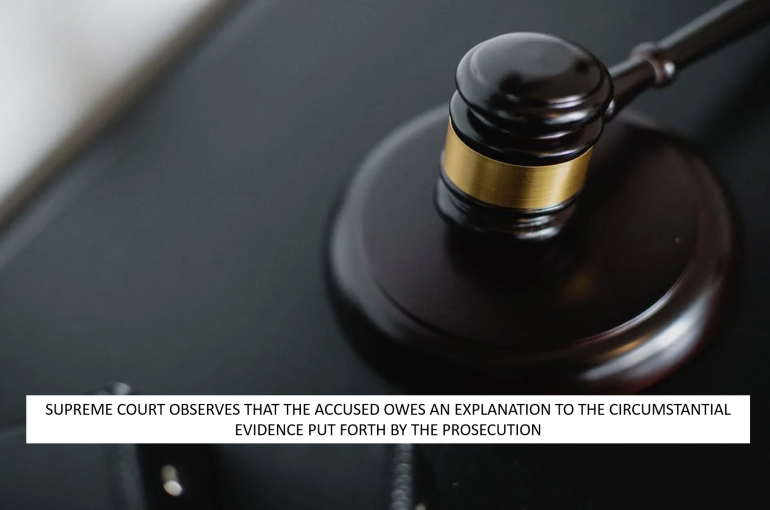SUPREME COURT OBSERVES THAT THE ACCUSED OWES AN EXPLANATION TO THE CIRCUMSTANTIAL EVIDENCE PUT FORTH BY PROSECUTION
Recently, a two Judge Bench of the Supreme Court comprising of Justice Ajay Rastogi and Justice Bela M. Trivedi passed a Judgment dated 17.02.2023 in Ram Gopal S/O Mansharam Vs. State Of Madhya Pradesh in Special Leave Petition (Crl.) No. 9221 of 2018, and has observed that an accused owes an explanation under Section 106 of the Evidence Act, 1881 (Burden of proving fact especially within knowledge) to the circumstantial evidence brought on record by the Prosecution regarding the offence that may have taken place. In the event that such accused does not offer any explanation to such circumstantial evidence, then conviction can be based on the corroborative evidence forming a chain of circumstances that establish the guilt of the accused.
FACTS
The Petitioner-Accused Ramgopal alias Gopal was the Sarpanch of the Village, Har Gangoli, Madhya Pradesh. The Complainant Upendra Singh reported at the Police Station Baghchini on 20.12.1995, 09:30 AM that on the previous day i.e. 19.12.1995 at about 5 PM, his Uncle, Pratap Singh Sikarwar was taken away by the Petitioner-Accused Ramgopal from Arhela, and thereafter, his Uncle’s dead body was found lying on the road near the house of Bharosibaba at Village, Chachiha. He further alleged in the Complaint that his Uncle had injuries on his head and ear and blood was oozing out from the said parts. The Investigating Officer, after carrying out the investigation, filed a Chargesheet against the Petitioner- Ramgopal along with three other Accused i.e., Suresh Singh, Chhotey Singh and Karan Singh before the Ld. First Additional Sessions Judge, Morena (Sessions Court) in ST No. 205/1996.
The Ld. Sessions Court framed charge against the Accused for the offence under Section 302 of the Indian Penal Code 1860 (IPC) (Punishment for murder) and in the alternative Section 302 read with 34 IPC (Acts done by several persons in furtherance of common intention). That after appreciating the evidence on record, the Ld. Sessions Court vide Order dated 17.01.2000 convicted the Petitioner-Ramgopal for the offence under Section 302 IPC, however acquitted the other three Accused giving them benefit of doubt. The Petitioner-Accused was convicted for the offence under Section 302 IPC and was sentenced to undergo life imprisonment with fine of Rs. 5,000/- and in default thereof to suffer further rigorous imprisonment for a period of 2 years.
Being aggrieved by the Ld. Sessions Court’s Order dated 17.01.2000, the Petitioner preferred an Appeal before the Madhya Pradesh High Court at Gwalior in Criminal Appeal No. 70/2000, which came to be dismissed by the Impugned Order dated 13.07.2018.
REASONING AND ANALYSIS
Aggrieved by the Impugned Order dated 13.07.2018 of the Madhya Pradesh High Court, the Accused filed a Special Leave Petition before the Supreme Court.
The Apex Court relied on its earlier Judgment, Rajender vs. State (NCT of Delhi), 4 (2019) 10 SCC 623, wherein the Supreme Court observed that;
“If a person is last seen with the deceased, he must offer an explanation as to how and when he parted company with the deceased. In other words, he must furnish an explanation that appears to the court to be probable and satisfactory, and if he fails to offer such an explanation on the basis of facts. within his special knowledge, the burden cast upon him under Section 106 is not discharged. Particularly in cases resting on circumstantial evidence, if the Accused fails to offer a reasonable explanation in discharge of the burden placed on him, such failure by itself can provide an additional link in the chain of circumstances proved against him. This, however, does not mean that Section 106 shifts the burden of proof of a criminal trial on the Accused. Such burden always rests on the prosecution. Section 106 only lays down the rule that when the Accused does not throw any light upon facts which are specially within his/her knowledge and which cannot support any theory or hypothesis compatible with his innocence, the court can consider his failure to adduce an explanation as an additional link which completes the chain of incriminating circumstances.”
In the present case, the Supreme Court observed that:
“Once the theory of “last seen together” was established by the prosecution, the Accused was expected to offer some explanation as to when and under what circumstances he had parted the company of the deceased. It is true that the burden to prove the guilt of the Accused is always on the prosecution, however in view of Section 106 of the Evidence Act, when any fact is within the knowledge of any person, the burden of proving that fact is upon him.”
CONCLUSION
Thus, based on the aforesaid observations, the Apex Court refused to interfere with the Impugned Order dated 13.07.2018 of the Madhya Pradesh High Court on the ground that it was duly proved that the death of the Deceased was homicidal. It was not disputed that the Petitioner had taken the Deceased with him on the previous day evening and thereafter he was also seen with the Deceased by the witness and the very next early morning, the dead body of the Deceased was found lying in the village field. The Supreme Court further observed that the Petitioner did not give any explanation to the circumstantial evidence produced by the Prosecution, hence, based on the corroborative evidence that establish the guilt of the Petitioner, the Petitioner’s conviction was upheld by the Supreme Court. As a result, the Appeal was dismissed.
Devashish Kakkar
Legal Associate
The Indian Lawyer





































Leave a Reply